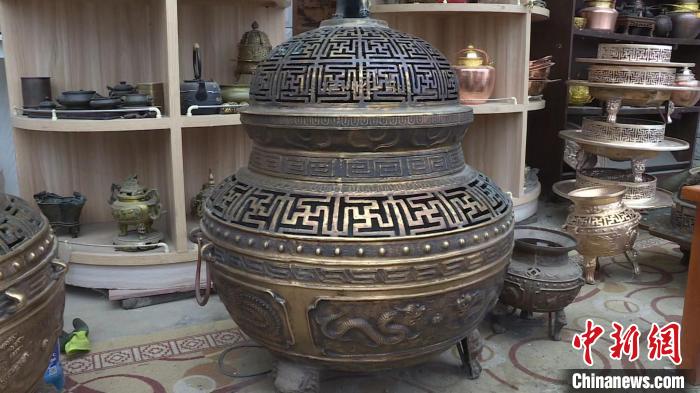Chinanews.com, Lanzhou, February 28th (Wenjing Dalacao) The casting knife slid across the rotating mold, and the gravel seemed to dance on the tip of the knife… Chen Feng engraved on the mold with a concentrated expression. He said that in the past, the patterns were mainly Tibetan patterns, but now they add Han cultural elements, are committed to the integration of Tibetan and Chinese cultures, and explore new ways of development.
The 37-year-old Chen Feng is a county-level inheritor of copper-aluminum casting in Minxian County, Dingxi City, Gansu Province. He has been interested in this craft since he was a child because he watched his father cast copper-aluminum ware. . He has been engaged in copper and aluminum casting for more than 20 years, and now he always completes the carving patterns in one go.
The copper-aluminum casting technique of Minxian County is a provincial intangible cultural heritage in Gansu Province. It is produced through more than a dozen processes such as plastic molding, mold repairing, engraving, mold closing, casting, and polishing. The craftsman uses sand as raw material, mixes it with clay, and makes the required mold, and then carves patterns on it, and then pours high-temperature molten copper or aluminum water into the mold. After it cools down, break the sand mold and take out the finished product. The sand can be reused.
“However, copper casting molds are disposable, and each casting is irreproducible.” Chen Feng said that copper and aluminum casting in Minxian County is a typical representative of ancient smelting and casting techniques, and it is also the research center for pure manual casting techniques. living fossil”. Pure handwork and uniqueness endow bronzes with great cultural value and collection value.
 The picture shows Gansu provincial-level copper-aluminum casting technology experience area.Photo by Dara Cao
The picture shows Gansu provincial-level copper-aluminum casting technology experience area.Photo by Dara CaoThe local area is especially represented by the hand-casting in Qingshui Village, Qingshui Town, which has a history of hundreds of years. Its production technology and utensil shape retain the traditional Chinese casting technology, which has extremely high historical and cultural value.
Min County is adjacent to Gannan Tibetan Autonomous Prefecture. Therefore, traditional copper and aluminum casting products are mainly Tibetan people’s daily utensils such as cauldrons, braziers, and incense burners. Due to the sluggish market, the high cost of recycling copper materials, and the long learning time, many artisans chose to go out to work. In recent years, the improvement of living standards in ethnic areas such as Gannan Prefecture has brought a broader market for the innovation and development of copper and aluminum casting techniques.
“In the past, the copper stoves we sold did not have lids, because they were more expensive and cost copper. Now people are more willing to pay twice the price to buy ones with lids.” Chen Feng said, Qingshui bronze wares have turned from daily necessities to Cultural collections accelerate the growth of the bronze casting industry.
Over the years, Chen Feng has not been ingenious for the prosperity, and has continued to inherit and develop this skill. In the past, the finished products were of a single type, including copper pots, braziers, and stoves, but now they have diversified, and there are various forms of copper and aluminum works such as copper bells, incense burners, and vases. The large copper pots and bells he cast are very popular and sold all over the world. From the previous family workshop to the current cooperative, and opened a store himself, he will continue to pass on this skill. (over)


